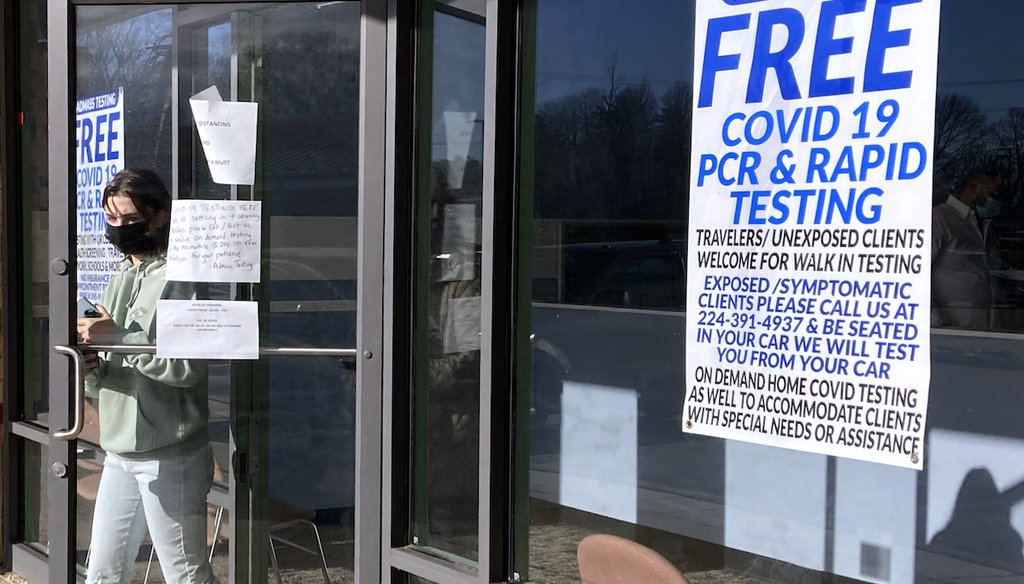

Our only agenda is to publish the truth so you can be an informed participant in democracy.
We need your help.


People leave a free COVID-19 PCR testing site in Glenview, Illinois. (AP)
The Centers for Disease Prevention and Control, or CDC, tweeted that "there’s a 10% chance" that people’s PCR tests were sent to laboratories across the country for genomic sequencing analysis.
Genomic sequencing is a process that analyzes the genetic makeup of a virus to track its spread and understand how it mutates.
Though swabs used for PCR tests contain human DNA, one of the first steps in the sequencing is to isolate the coronavirus genetic material from the rest of the sample.
To explain what happens after a nasal swab test for COVID-19, the Centers for Disease Prevention and Control tweeted that "there’s a 10% chance" that it was sent to laboratories across the U.S. for genomic sequencing analysis.
Genomic sequencing is a process that analyzes the genetic makeup of a virus to track its spread and mutations, according to the CDC.
Some people who saw the CDC’s tweet questioned whether the agency is using a lot more personal information from the polymerase chain reaction (PCR) tests than it lets on.
"Largest collection of human data in history, with NO consent. Figures. Anyone else not done a single test?" tweeted Stanton Hom, a prenatal and pediatric chiropractor on Feb. 17, 2022.
Screenshots of the tweet were shared on Instagram, where they were flagged as part of Meta’s efforts to combat false news and misinformation on its news feed. (Read more about PolitiFact’s partnership with Meta, the parent company of Facebook and Instagram.)
The post falsely suggested that the CDC had amassed an enormous collection of people’s DNA through the use of PCR tests.
The CDC is "talking about sequencing the virus," said Dr. David Fisman, professor of epidemiology at the University of Toronto. "It has nothing to do with human genomes."
The CDC made the same point in a follow-up tweet.
The "tweet regarding genomic sequencing led some people to believe that personal identifying information was included in samples processed in the sequencing program," a spokesperson for the CDC told PolitiFact. "That is not the case."
A PCR test is used to detect genetic material from the virus, according to the Cleveland Clinic. When conducting a PCR test, a health care provider uses a swab to collect respiratory material from a person’s nose.
The sample is tested for the genetic material of SARS-CoV-2, the virus that causes COVID-19. U.S. public health agencies then send a small percentage of these samples to the CDC.
The CDC then conducts genetic sequencing of these samples to identify variants, monitor their spread and track hotspots, and determine their ability to evade medical treatments and vaccines.
In the past year, the agency has used genomic sequencing of PCR tests to estimate the percentage of COVID-19 cases caused by the delta and omicron variants.
Though the swabs contain human DNA, one of the first steps in the sequencing is to isolate the coronavirus genetic material from the rest of the sample.
It is also worth noting that while genomic sequencing can be conducted on DNA, COVID-19 has ribonucleic acid, or RNA, according to the CDC.
"This is targeted specifically to the viral RNA, and human genes are not copied or sequenced," said Cindy Prins, clinical associate professor of epidemiology at the University of Florida. "The end result is just the sequence of the COVID-19 genes, which allows scientists to determine what variant was in the sample."
An Instagram post said that the CDC had the "largest collection of human data in history" from COVID-19 PCR tests.
The post referenced a tweet from the CDC that said that a small percentage — about 10% — of PCR tests were sent to the agency to conduct genomic sequencing on the virus.
Genomic sequencing is used to track the virus and its variants.
While the swab used in the PCR test would likely possess some human DNA, the sequencing is carried out on the coronavirus. One of the first steps of genomic sequencing is to isolate and extract the coronavirus genetic material from the sample.
The CDC clarified that personal identifying information is not extracted. Independent scientists agreed that human DNA was not needed to sequence the virus that causes COVID-19.
We rate this claim False.
U.S. Centers for Disease Prevention and Control, tweet, Feb. 16, 2022
U.S. Centers for Disease Prevention and Control, What is Genomic Surveillance?
U.S. Centers for Disease Prevention and Control, CDC’s Role in Tracking Variants
Cleveland Clinic, COVID-19 and PCR Testing
PolitiFact, Large-scale testing, not individual testing, tells when delta variant causes COVID-19, July 26, 2021
Email interview with Jasmine Reed, public affairs specialist for the CDC, Feb. 22, 2022
Email interview with David Fisman, professor of epidemiology at the University of Toronto, Feb. 22, 2022
Email interview with Cindy Prins, clinical associate professor at the University of Florida, Feb. 22, 2022
In a world of wild talk and fake news, help us stand up for the facts.
